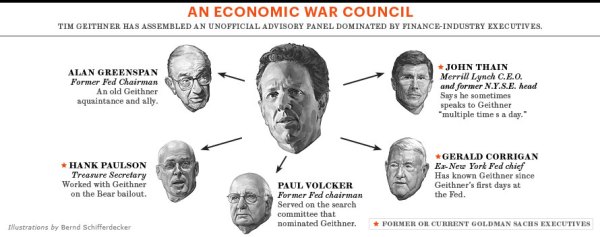
By Lois Romano
Washington Post Staff Writer
Tuesday, May 26, 2009
Like his boss, Timothy Geithner lived overseas as a youngster and is always up for a game of pickup basketball. But the Treasury secretary has never shared the court with Barack Obama -- and he's quick to admit he may not be in the president's league.
"The president's really good at basketball," he says. "I think he's a better basketball player than I am."
Athletics are one of Geithner's few outlets these days as he leads Obama's intense efforts to resuscitate the economy. He sat for an interview Friday in Treasury's elegant Diplomatic Reception Room, where dollar signs are carved into the wood chairs.
Geithner, 47, had a bumpy introduction to the American people over some back taxes he owed, and his life has been a pressure cooker ever since. Still, he was cheered by fans upon arrival at the recent White House Correspondents' Association dinner, and he squirms when asked about People magazine anointing him one of "Barack's Beauties."
The former president of the New York Federal Reserve Bank says he was well aware when he took the Treasury post that he could end up the national fall guy for rising unemployment, record foreclosures and bank closings.
"Oh, absolutely," he says without missing a beat. "I've been living in this world for a long period of time." In fact, Geithner hails from a long line of public servants: His grandfather was an adviser to President Dwight D. Eisenhower.
Early next week, he meets with Chinese officials in Beijing on trade and other issues. Before he goes, though, he has more domestic crises to face -- perhaps forcing another automaker into bankruptcy. But wait -- this is a good thing, he says.
Here are excerpts from the interview:
Romano: You are laying the groundwork for General Motors to be forced into bankruptcy, maybe as early as June 1st?
Geithner: Well, I wouldn't say it that way. What we're doing is helping this critically important company . . . put in place a restructuring plan that [will allow it to] emerge viable without government support over the long term, allow it to continue to play this critical central role in the whole American experience.
Romano: But by the time you're done with GM, you will have invested $45 billion? How much is too much?
Geithner: The president has made it clear that we're prepared, if we see a restructuring plan with enough shared sacrifice that allows this company to emerge viable over time . . . we think that's a totally legitimate, appropriate use of public resources, given the cost to the American economy of allowing this company to go under.
Romano: The United States government now owns part of the insurance industry, part of the auto industry, part of the banking industry. How do you keep from making the micro decisions when you're making the big decisions about these companies?
Geithner: It's a very important question. We did not want to be in the business of running on a day-to-day basis any of these entities. We did not want to be in business of owning any share of these companies over the longer term.
Romano: You've said that the public-private partnerships [program to help relieve banks of toxic assets] should be ready by July. Have you had to go out there and sell this to the private investors -- to convince them that it's a good deal to go into business with the government, in light of the political climate, what happened with AIG and the bonuses?
Geithner: You're right. There's still a bit of concern about whether, if you participated in these programs, you'll face in the future some change in the rules of the game, and that's causing a bit of concern still, and we're going to work to limit that concern.
Romano: You were selected by People magazine as one of "Barack's Beauties." So is that a compliment to you?
Geithner: It's not a good thing for the secretary of the Treasury to be on the list like that.
Romano: Your father worked with Barack Obama's mother at the Ford Foundation in Asia?
Geithner: Well, I didn't know this, nor did the president know it, but it turns out that when he was at the Ford Foundation, one of the programs he oversaw was the program the president's mother participated in.
Romano: Do you read the news stories about yourself?
Geithner: I generally don't read about myself in the papers.
Romano: And is that basically to keep sane?
Geithner: It really is a good strategy. If you -- if you focus on the perceptions, you won't get the policy right.

No comments:
Post a Comment